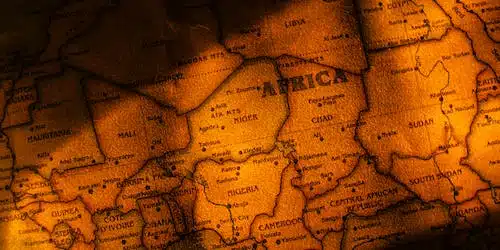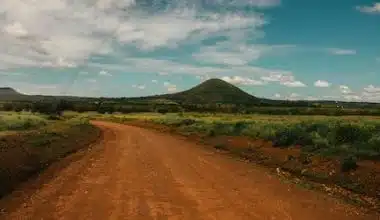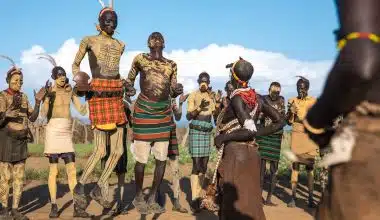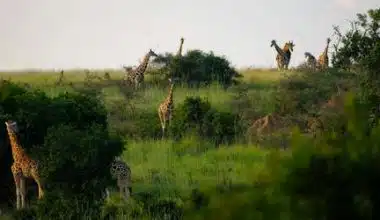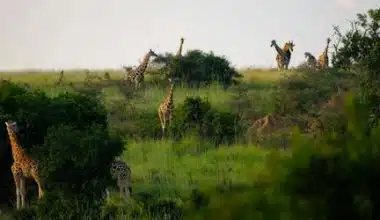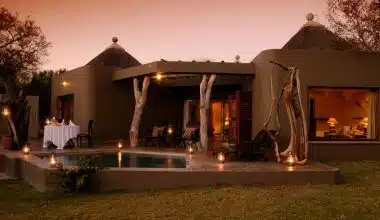The vast and diverse continent of Africa encompasses a multitude of nations, each with its unique identity, history, and cultural richness. The United Nations lists 54 African countries, each with unique features such as diverse cultures, natural beauty, colonial history, economic growth, and abundant natural resources. However, challenges like poverty, political instability, and health issues persist. Africa’s youthful population presents both opportunities and challenges for education, employment, and social development. This article elaborates on this information for your clarity and understanding.
All Countries In Africa
The United Nations lists 54 African countries, including Nigeria, Ethiopia, Egypt, the DR Congo, Tanzania, South Africa, Kenya, Uganda, Sudan, Algeria, Morocco, Angola, Ghana, Mozambique, and Madagascar.
Features of the All countries in Africa
#1. Diverse Cultures
Africa is home to a rich tapestry of cultures, languages, and traditions. With over 2,000 distinct languages spoken across the continent, it showcases incredible linguistic diversity.
#2. Natural Beauty
Africa boasts stunning landscapes, including the Sahara Desert, the Nile River, the Serengeti, Victoria Falls, and the diverse wildlife found in national parks like the Maasai Mara and Kruger National Park.
#3. Colonial History
Many African countries have a history of colonization by European powers, which has had a lasting impact on their political, social, and economic structures. Independence movements in the mid-20th century led to the establishment of sovereign nations.
#4. Economic Growth
Africa is experiencing significant economic growth, with several countries emerging as major players in industries such as telecommunications, agriculture, mining, and tourism. However, challenges such as poverty, inequality, and corruption persist.
#5. Natural Resources
Africa is rich in natural resources, including oil, gas, minerals, and agricultural products. The extraction and export of these resources play a crucial role in many African economies.
#6. Challenges and Opportunities
African countries face various challenges, including poverty, political instability, armed conflicts, and health issues such as HIV/AIDS and malaria. However, there are also numerous opportunities for development, investment, and innovation.
#7. Youthful Population
Africa has a youthful population, with a significant percentage under the age of 25. This demographic presents both opportunities and challenges for education, employment, and social development.
#8. Regional Organizations
African countries collaborate through regional organizations such as the African Union (AU), the Economic Community of West African States (ECOWAS), and the Southern African Development Community (SADC) to address common issues, promote regional integration, and foster cooperation.
#9. Political Systems
African countries have diverse political systems, including presidential democracies, parliamentary systems, constitutional monarchies, and authoritarian regimes. Each country has its own unique political landscape and governance structures.
#10. Languages
While many African countries have official languages inherited from their colonial history (such as English, French, and Portuguese), there are also numerous indigenous languages spoken across the continent. Swahili, Arabic, Hausa, Yoruba, and Amharic are just a few examples of widely spoken African languages.
Benefits Found In Countries In Africa
#1. Tourist Attractions
African countries offer a wide range of tourist attractions, including breathtaking natural landscapes, wildlife safaris, historical sites, cultural festivals, and vibrant cities. Countries like South Africa, Kenya, Tanzania, Egypt, Morocco, and Namibia are popular destinations for tourists.
#2. Visa Requirements
Visitors to African countries may need to obtain visas before their trip. Visa requirements vary by country and the traveler’s nationality. Some countries offer visa-free or visa-on-arrival entry for certain nationalities. It is important to check the specific visa requirements for each country before traveling.
#3. Cultural Experiences
Africa is known for its rich cultural heritage. Visitors can immerse themselves in local traditions, music, dance, art, and cuisine. Each country has its unique cultural practices and festivals that offer a glimpse into the local way of life.
#4. Adventure and Outdoor Activities
Africa is a playground for adventure enthusiasts. Visitors can enjoy activities such as safari game drives, trekking to see gorillas or chimpanzees, hiking Mount Kilimanjaro, exploring the Sahara Desert, diving in the Red Sea, or experiencing adrenaline-pumping water sports along the coast.
#5. Wildlife and Nature Conservation
African countries are home to diverse wildlife and natural habitats. Visitors can witness the Big Five on safari, go birdwatching, or visit national parks and reserves to support wildlife conservation efforts.
#6. Cultural Heritage Sites
Africa is rich in historical and archaeological sites that showcase the continent’s ancient civilizations. Countries like Egypt, Ethiopia, Mali, Zimbabwe, and South Africa have UNESCO World Heritage Sites, such as the Pyramids of Giza, Lalibela Rock-Hewn Churches, Great Zimbabwe, and Robben Island.
#7. Beaches and Coastal Retreats
Africa has stunning coastlines with beautiful beaches and crystal-clear waters. Countries like Seychelles, Mauritius, Zanzibar (Tanzania), Cape Verde, and Mozambique offer idyllic beach destinations for relaxation, water sports, and marine exploration.
#8. Culinary Delights
African cuisine is diverse and flavorful, with each country offering its traditional dishes. Visitors can indulge in local delicacies such as tagines (North Africa), jollof rice (West Africa), injera (Ethiopia), bobotie (South Africa), and seafood specialties along the coast.
#9. Cultural Tourism and Community Engagement
Many African countries promote community-based tourism initiatives, allowing visitors to interact with local communities, learn about their traditions, and support sustainable development projects. This type of tourism provides a more immersive and authentic experience.
#10. Business and Investment Opportunities
Africa is a growing hub for business and investment. Many countries offer opportunities for trade, investment, and partnerships in sectors such as agriculture, mining, energy, technology, and infrastructure development.
All Countries In Africa List
Africa is divided into five regions or subregions: North Africa, West Africa, East Africa, Central Africa, and Southern Africa.
#1. North Africa
North African countries include Algeria, Egypt, Libya, Mauritania, Morocco, Sudan, and Tunisia.
#2. West Africa
The countries in West Africa include Benin, Burkina Faso, Cape Verde, Ivory Coast (Côte d’Ivoire), Gambia, Ghana, Guinea, Guinea-Bissau, Liberia, Mali, Mauritania, Niger, Nigeria, Senegal, Sierra Leone, and Togo.
#3. East Africa
East Africa includes Burundi, Comoros, Djibouti, Eritrea, Ethiopia, Kenya, Madagascar, Malawi, Mozambique, Rwanda, the Seychelles, Somalia, South Sudan, Tanzania, Uganda, Zambia, and Zimbabwe.
#4. Central Africa
Central Africa includes Angola, Cameroon, the Central African Republic, Chad, the Democratic Republic of the Congo, Equatorial Guinea, Gabon, and Sao Tome and Principe.
#5. Southern Africa
Southern Africa includes Botswana, Eswatini (formerly Swaziland), Lesotho, Namibia, and South Africa.
Bodies in Charge of Countries in Africa
Several international and regional bodies play important roles in governing and coordinating activities in countries across Africa.
The key bodies include:
#1. African Union (AU)
The African Union is a continental organization consisting of 55 member states in Africa. It aims to promote unity, peace, and development on the continent. The AU is responsible for coordinating policies, implementing programs, and addressing regional challenges in Africa.
#2. United Nations (UN)
The United Nations is an international organization that includes almost all countries in the world, including those in Africa. The UN plays a vital role in promoting peace, security, human rights, and sustainable development globally. It provides a platform for member states to discuss and address various issues affecting countries in Africa.
#3. Economic Community of West African States (ECOWAS)
ECOWAS is a regional economic community comprising 15 West African countries. It aims to promote economic integration, peace, and stability in the region. ECOWAS facilitates cooperation among member states in areas such as trade, infrastructure development, and security.
#4. Southern African Development Community (SADC)
SADC is a regional organization consisting of 16 countries in southern Africa. It promotes regional integration, economic development, and cooperation among member states. SADC focuses on areas such as trade, agriculture, infrastructure, and peace and security.
#5. East African Community (EAC)
The East African Community is an intergovernmental organization comprising six countries in East Africa. It aims to promote economic integration, social development, and regional cooperation. The EAC focuses on areas such as trade, infrastructure, education, and health.
#6. Arab League
The Arab League is a regional organization consisting of 22 member states, including some countries in North Africa. It aims to promote cooperation, coordination, and solidarity among Arab countries. The Arab League addresses various political, economic, and social issues affecting member states.
#7. Regional Economic Communities (RECs)
There are several other regional economic communities in Africa, such as the Economic Community of Central African States (ECCAS), the Intergovernmental Authority on Development (IGAD), and the Community of Sahel-Saharan States (CEN-SAD). These RECs focus on regional integration, economic development, and cooperation within their respective regions.
Challenges Faced by Countries in Africa
Africa faces various challenges across different sectors. These challenges include
#1. Healthcare System Challenges
The healthcare systems in Africa face numerous challenges, including limited access to quality healthcare services, inadequate infrastructure, a shortage of healthcare professionals, and insufficient funding. These challenges hinder the delivery of effective healthcare and impact the overall health outcomes of the population.
#2. Economic Challenges
Many countries in Africa struggle with economic challenges such as low economic growth, high unemployment rates, income inequality, and limited access to financial resources. These challenges can hinder development, exacerbate poverty, and limit opportunities for economic advancement.
#3. Governance Challenges
Africa faces governance challenges, including issues related to democracy, human rights, corruption, and weak institutions These challenges can hinder political stability, impede development, and limit the effective functioning of governments.
#4. Climate Change
Africa is particularly vulnerable to the impacts of climate change, including increasing temperatures, changing precipitation patterns, and extreme weather events. These changes pose significant threats to human health, food security, water resources, and socio-economic development in the region.
#5. Infrastructure Deficits
Many countries in Africa face infrastructure deficits, including inadequate transportation networks, limited access to electricity, and insufficient water and sanitation facilities. These deficits hinder economic growth, limit access to basic services, and impede development.
#6. Education Challenges
Access to quality education remains a challenge in many African countries. Issues such as limited access to schools, inadequate resources, and low literacy rates hinder educational development and opportunities for the population.
#7. Conflict and Security
Several countries in Africa face ongoing conflicts, political instability, and security challenges. These conflicts can disrupt social and economic development, displace displaced populations, and hinder progress in various sectors.
#8. Health Challenges
Africa faces various health challenges, including high prevalence rates of infectious diseases such as HIV/AIDS, malaria, and tuberculosis. Limited access to healthcare services, inadequate healthcare infrastructure, and insufficient resources for disease prevention and control contribute to these health challenges.
#9. Child Labor and Forced Labor
The Bureau of International Labor Affairs (ILAB) has a list of African nations that use forced or child labor to produce goods. Efforts are being made to address these issues and promote fair labor practices.
#10. Trade Liberalization
Many African countries face challenges in benefiting from global trade liberalization. Structural problems, weak policy frameworks, protectionism, and dependence on traditional commodities contribute to their marginalization in global trade.
How Many Countries Are In Africa In The World?
The United Nations lists 54 countries in Africa, including Algeria, Angola, Benin, Botswana, Burkina Faso, Burundi, Cameroon, Cape Verde, the Central African Republic, Chad, Comoros, the Democratic Republic of the Congo, Djibouti, Egypt, Equatorial Guinea, Eritrea, Eswatini, Ethiopia, Gabon, Gambia, Ghana, Guinea-Bissau, Ivory Coast (Côte d’Ivoire), Kenya, Lesotho, Liberia, Libya, Madagascar, Malawi, Mali, Mauritania, Mauritius, Morocco, Mozambique, Namibia, Niger, Nigeria, Rwanda, Sao Tome and Principe, Senegal, Seychelles, Sierra Leone, Somalia, South Africa, South Sudan, Sudan, Tanzania, Togo, Tunisia, Uganda, Zambia, and Zimbabwe.
What Are the 7 Biggest Countries in Africa?
The seven largest countries in Africa based on land area are Algeria, the Democratic Republic of the Congo, Sudan, Libya, Chad, Niger, and Angola. These countries vary in location and are spread across different regions of the continent.
Are There 257 Countries In The World?
There are 195 countries in the world. This count includes 193 member states of the United Nations and 2 non-member observer states (the Holy See and the State of Palestine). Therefore, the statement that there are 257 countries in the world is not accurate.
Which Is The Richest Country In Africa?
The richest country in Africa can be determined based on different criteria, such as GDP, GDP per capita, or private wealth. Nigeria is considered the richest country in Africa based on GDP in the current USD. Egypt ranks as the richest country in Africa based on total GDP in PPP-adjusted international dollars. South Africa is mentioned as the third-richest country in Africa based on GDP and PPP measures. Seychelles is mentioned as the richest country in Africa based on GNI per capita.
Conclusion
Africa offers a variety of tourist attractions, including natural landscapes, wildlife safaris, historical sites, cultural festivals, and vibrant cities. Visa requirements vary by country, but each country offers unique cultural experiences. Africa is also known for adventure, wildlife conservation, cultural heritage sites, and stunning coastlines, making it an ideal destination for travelers. The African Union, United Nations, and ECOWAS are key international and regional bodies responsible for governing and coordinating activities in African countries. They promote unity, peace, and development, address regional challenges, and facilitate cooperation.
- COUNTRIES WITHOUT COVID RESTRICTIONS
- THE ULTIMATE LIST OF THE AFRICAN ISLAND COUNTRIES
- HOW TO MOVE ACROSS THE COUNTRY: Detailed Guide
- US PASSPORT VISA FREE COUNTRIES IN 2024
- THE BEST COUNTRY TO VISIT IN 2024
